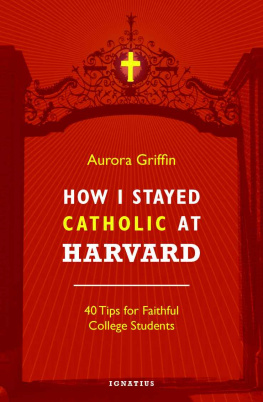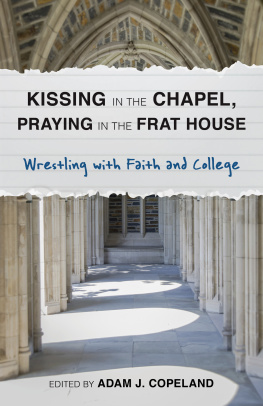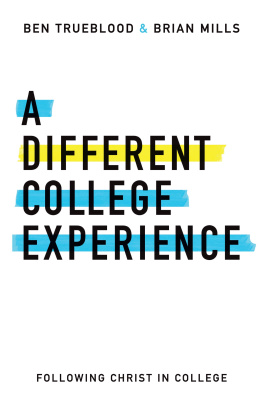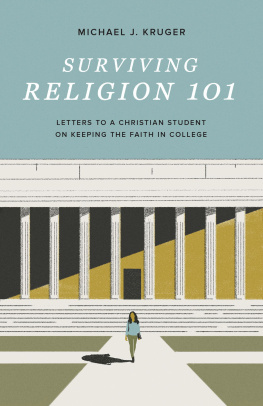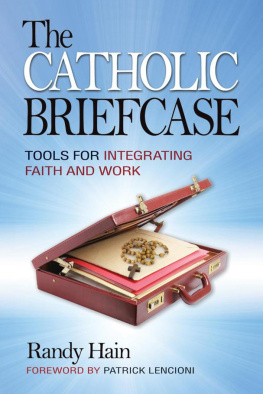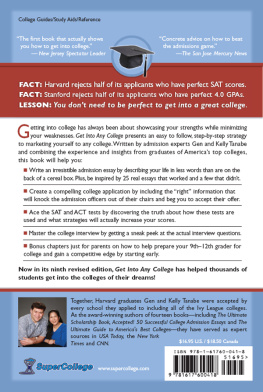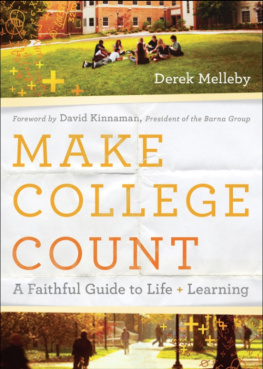HOW I STAYED
CATHOLIC AT HARVARD
Aurora Griffin
HOW I STAYED
CATHOLIC AT
HARVARD
Forty Tips for Faithful College Students
IGNATIUS PRESS SAN FRANCISCO
Cover photograph iStockphoto
Cover design by John Herreid
2016 by Ignatius Press, San Francisco
All rights reserved
ISBN 978-1-62164-128-5 (PB)
ISBN 978-1-68149-727-3 (EB)
Library of Congress Control Number 2016939651
Printed in the United States of America
For my parents,
who gave me the greatest gifts
of life and faith,
that we may enjoy them together,
forever .
CONTENTS
ACKNOWLEDGMENTS
I would like to thank everyone who helped me to live out my faithbefore, throughout, and since collegeas well as those who helped edit and publish this book. Writing these acknowledgments, I am struck by the embarrassment of riches I have in the number of loving, faithful people in my life. I do not know where I would be without you all, including many whom I dont have space to mention here. I prayed for you as I wrote this book, with joy and gratitude.
I first want to thank my family for encouraging me in every way possible, but most importantly in the Faith. Thank you, Dad, for teaching me the Catechism as a child and reading through Bible stories with me. Because you never watered down the truth, I am not afraid of it when it seems difficult or inconvenient. And thank you, Mom, for showing me what faith in charity looks like by constantly giving of yourself to me and Paul. Thank you, Paul, for showing our family what childlike faith is. I also want to thank my extended family, the Catholic Griffins and the Baptist Johnsons, who have been a continued source of support and an example to me of Christian living.
Thank you to my high school teachers from Oaks Christian, especially Jim Lee, Pam Gill, Ryan Summers, and Mary Kay Altizer, who showed me love and understanding in the times I most struggled with my faith. Thank you for teaching me that a relationship with Christ is the most precious thing in this life and the next.
I also want to thank the academy, or at least the people at Harvard who helped me to stay Catholic in college. To people who think it is a godless place, I offer the witness of my closest friends: Luciana Milano, James Holt, Kip Christianson, Patrick Spence, Jim McGlone, and Tyler Dobbs. You all inspired me to love Christ more through our friendship. I also relied on the support and friendship of great professors, like Richard Tarrant, James Hankins, and Leah Whittington. I appreciate the prayers and examples of my friends at Opus Dei and the Fellowship of Catholic University Students (FOCUS) missionaries, especially Tricia Lester.
I also want to thank those who helped me with the book. Thank you to all my friends who offered to edit chapters and gave me valuable feedback. Thank you, Sam Gregg and Michael Novak, for giving me both constructive criticism and encouragement. I can hardly believe that people who are so brilliant and accomplished can also be so generous with their time.
And finally, thank you, Peter Kreeft, for writing the foreword. You have been my intellectual hero for years now, and I could never have anticipated having your name on my first book. I am humbled, grateful, and very excited to see what the Lord does with it.
FOREWORD
by Peter Kreeft
As few products live up to their advertisements, few books live up to their titles. This one does.
Some books give you brilliant philosophy or scholarship. This one gives you something more precious and uncommon: common sense.
Some books give you uplift and edification. They inspire you so much that you feel like a saint when you read them, as if youve accomplished the things you dream of. This book gives you something much more valuable: forty concrete things to do that are, above all, utterly practical . That is the operative word, the determining word, the truest word, for this book. These things work , if you do the work of doing them.
There are other good books on this topic (e.g., J. Budziszewskis How to Stay Christian in College ), but they are all written from above, by professors, parents, or priests. This one comes from below, from a student. This car has been road tested.
Archbishop Fulton Sheen told parents that the best way for their kids to lose their Catholic faith was to go to a Catholic college. (That was before the founding of Thomas Aquinas College, Franciscan University of Steubenville, or Ave Maria University.) I must add that the best way to keep it, at any college, is to read this book.
Few things can be more important than the faith of the next generation. The future of our civilization, that is, the goodness and truth and beauty of our culture, depends on the Source of all goodness, truth, and beauty, God; and the umbilical cord to God is faithnot just faith in anything, but the Faith, the one God invented, not us. And the Faith is not automatic (it doesnt just happen), nor is it genetic (God has no grandchildren); it must be rediscovered, reaffirmed, chosen, and kept anew by each generation. If it falls into the abyss of the current generation gap, our culture will fall into an abyss of even greater nonsense, immorality, and ugliness than it already has. Nothing is more practical than drawing a line in the sand here and now.
And no place is more important than the university, because the university has replaced the church, the state, and even the family as the primary teacher and cultural determinant. Everyone who is influential in our culture is formed by the university: media people, pastors, teachers, politicians, scientists, businesspeople, lawyers, doctors, creative writers, journalistsalmost everyone but rappers and professional football players. This is the battlefield, now is the battle, and here is a very good set of weapons.
PREFACE
A Note to Students
May 29, 2014. The day of my Harvard graduation. My family and friends and several professors gathered for dinner at my favorite little restaurant in Cambridge. With dessert on its way, my dad stood and proposed a toast, opening the floor to anyone who wanted to say a few words.
On this day full of black robes and newly minted diplomas, I expected them to say how proud they were of my academic accomplishments. But they didnt. Instead, all of them, including my professors, said how impressed they were that I was able to stay Catholic at Harvard. It was easy to get caught up in the day and focus on my achievements, but they reminded me that leaving Harvard with my faith was more important than graduating with any worldly honors.
For a Catholic going to a secular university, it is all too easy to get swept up in what the world says is important in college. The attitude at most secular universities is that college is about having fun and finding yourself by casting off old ways of thinking, leaving your faith and values behind. For many, it becomes about partying and embracing radical philosophies. A worldly lifestyle promises glamour and excitement and fulfillment, but in the end, it is empty. Only as we become the people God made us to be, do we become freer, happier, and more ourselves.
I have found that faith doesnt take away from the rest of life: it gives it meaning. Jesus came that we may have life, and have it abundantly (Jn 10:10). More than that, God promises that if we love Him first, everything elsefriends, recognition, adventurewill come our way: Seek first his kingdom and his righteousness, and all these things shall be yours as well (Mt 6:33). The purpose of our time in college is to love the Lord more deeply and to develop the skills to serve Him more effectively. Living out my faith in college was not something I did in addition to my schoolwork, extracurriculars, and social life but was something that shaped how I experienced all those things.
Next page
